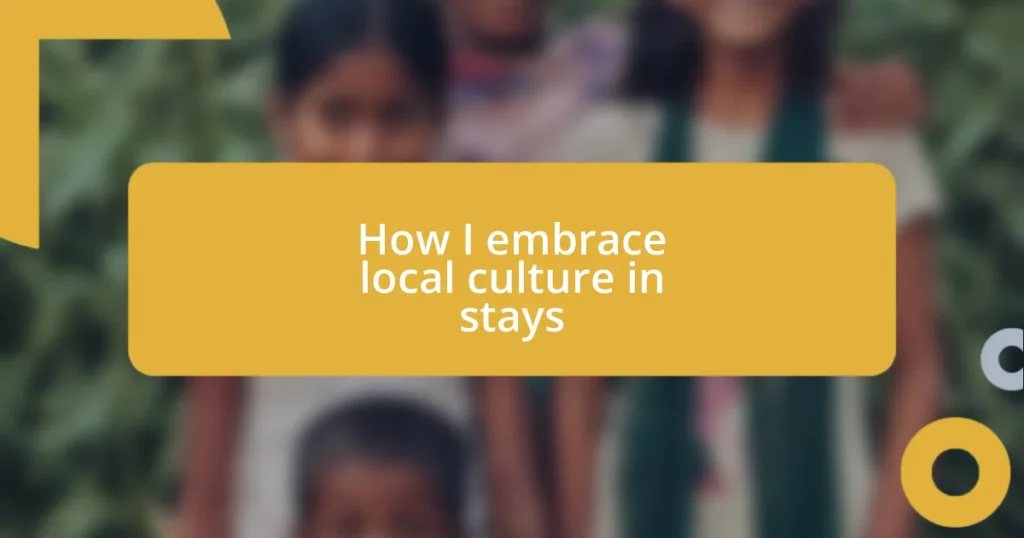Key takeaways:
- Chefs play multifaceted roles as creators, leaders, and mentors, deeply connecting food to emotions and memories.
- Building rapport with innkeepers and chefs enhances the dining experience through personal interactions, curiosity, and shared culinary stories.
- Engaging in collaborative opportunities, maintaining professional relationships, and utilizing social media are essential for fostering deeper connections within the culinary community.
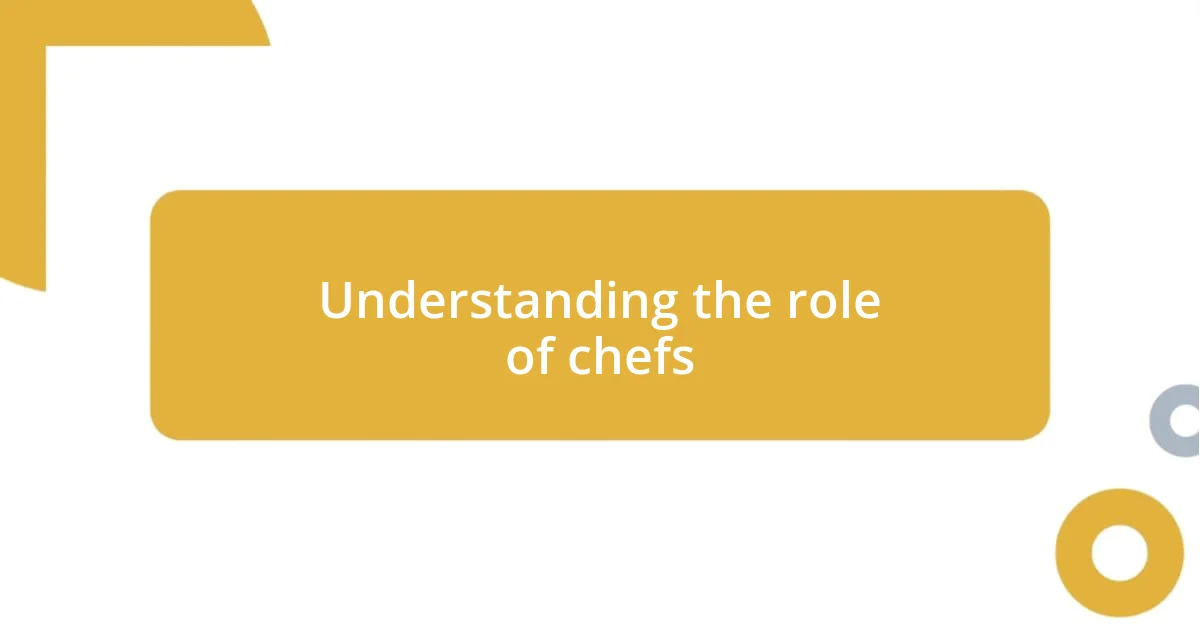
Understanding the role of chefs
Chefs serve as the heart of the culinary world, orchestrating the entire dining experience. Their expertise blends creativity with precision; I often find myself in awe of how they balance flavors while managing kitchen chaos. Have you ever wondered how a single dish can tell a story?
Every dish a chef presents is a reflection of their passion and dedication. I remember chatting with a chef who poured his soul into a simple risotto—a dish that he claimed carried memories of family gatherings. It made me realize just how deeply food connects us to our past and emotions.
Additionally, chefs often wear many hats beyond cooking. They act as leaders, educators, and even psychologists in their kitchens. When I see a chef mentoring a young cook, I can feel the energy shift, a silent understanding that they are passing down not just techniques, but a legacy of artistry and tradition. Isn’t it fascinating how their role transcends mere cooking?
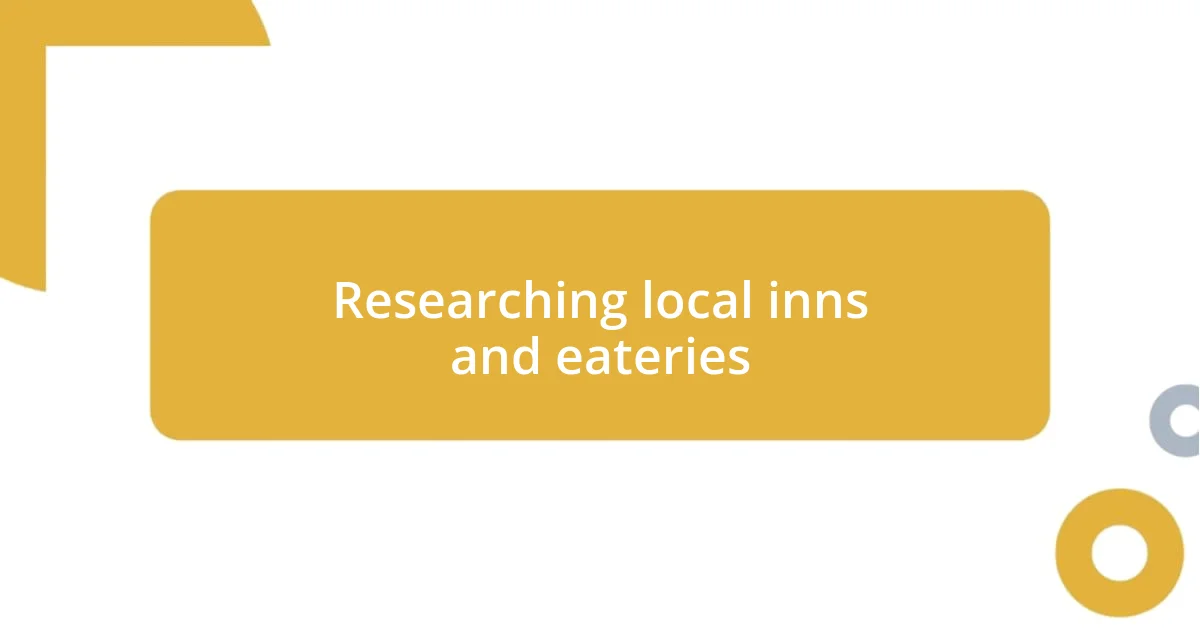
Researching local inns and eateries
Researching local inns and eateries is a delightful adventure for anyone who appreciates good food and a warm atmosphere. I often turn to social media platforms, like Instagram or TikTok, where the visuals alone can transport me to a cozy kitchen or an inviting dining room. Recently, I discovered an inn tucked away in a quaint village through a beautifully curated food blog, and I found myself captivated by the chef’s focus on farm-to-table ingredients and seasonal menus.
Once I find a few promising spots, I dive deeper into reviews and testimonials. I remember visiting a charming inn after reading about a chef who innovatively combined local flavors with traditional techniques. The moment I tasted that dish, I felt like I had traveled through their culinary journey. Researching these places not only enriches my dining experience but also fuels my passion for connecting with the chefs behind the magic.
In my experience, reaching out directly to the chefs or inn owners via email or social media can create meaningful connections. I once received a reply from a chef who was thrilled to share his inspiration for a dish I loved. It felt like an enriching exchange, where a few simple questions opened a door to the chef’s world, letting me glimpse the heart behind the hospitality.
| Research Method | Benefits |
|---|---|
| Social Media Exploration | Engaging visuals and personal stories that draw inspiration. |
| Reading Reviews | Gaining insights into the dining experience from real customers. |
| Direct Chef Outreach | Building personal connections that enhance the foodie experience. |
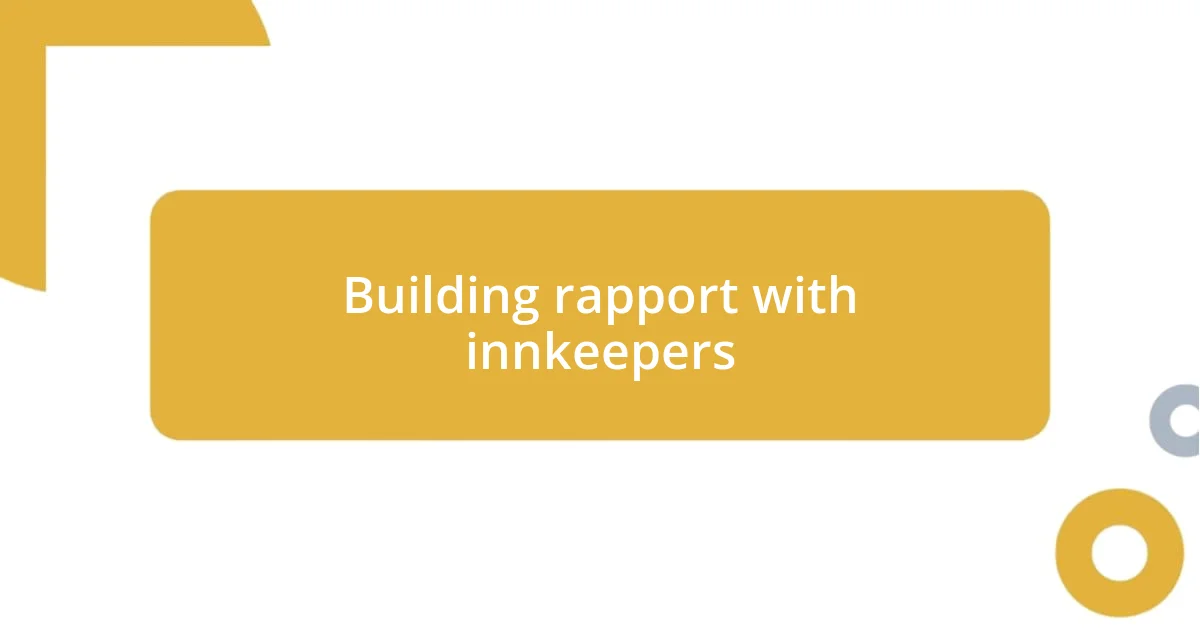
Building rapport with innkeepers
Building rapport with innkeepers is key to creating a memorable experience. I’ve found that a simple smile and a genuine greeting can pave the way for an engaging conversation. For instance, during a stay at an inviting inn, I shared a chuckle with the innkeeper over a quirky kitchen mishap. That moment transformed a routine check-in into a connection rooted in hospitality and warmth.
Here are some effective ways to build rapport with innkeepers:
- Be Curious: Ask questions about local ingredients or their favorite dishes to show genuine interest in their culinary journey.
- Share Your Story: Open up about your food preferences or past dining experiences; this fosters a more personal connection.
- Express Gratitude: A heartfelt thank you goes a long way. It shows appreciation for their efforts and dedication to hospitality.
- Connect on Social Media: Follow their inn’s social media accounts and engage with their content; it reinforces your interest and keeps the conversation flowing.
When I connected with an innkeeper over a shared love of a regional dish, it turned into an unexpected invitation to the kitchen. That day not only deepened my connection with the inn but also gifted me insights into the chef’s creative process. There’s something special about building these connections; it makes every meal feel personal and cherished.
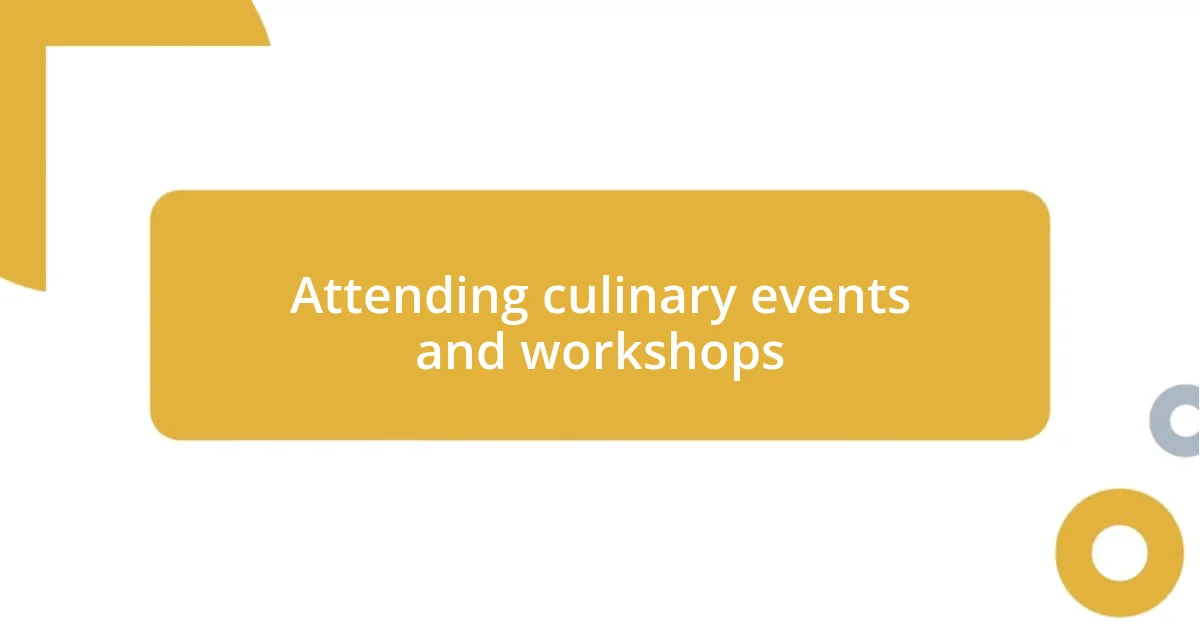
Attending culinary events and workshops
Attending culinary events and workshops opens up a world of flavors and connections that I cherish deeply. I vividly recall a local food festival where I had the chance to interact with various chefs who showcased their signature dishes. Engaging in conversations with them revealed not only their techniques but also the passion behind each dish they presented. It’s fascinating how a simple question about their culinary inspiration can lead to a rich discussion about their experiences and aspirations.
Workshops, too, are a treasure trove for building connections. I remember participating in a hands-on pasta-making class hosted by an enthusiastic chef. As we laughed over our imperfect shapes, the atmosphere felt more like a gathering of friends than a structured class. This camaraderie established a bond that extended beyond that day, allowing me to feel comfortable reaching out to the chef afterwards for tips and recipe ideas. Have you ever left a workshop feeling like you’ve just made a friend? That sense of belonging is what makes these experiences truly memorable.
Moreover, attending these events allows me to discover local ingredients and unique techniques firsthand. I once found myself tasting a vibrant heirloom tomato dish at a workshop that introduced me to a farmer who unexpectedly shared his agricultural insights. It made me realize the stories behind the food we eat are what make those flavors pop. By immersing myself in these culinary gatherings, I not only expand my palate but also foster connections that enrich my culinary journey.
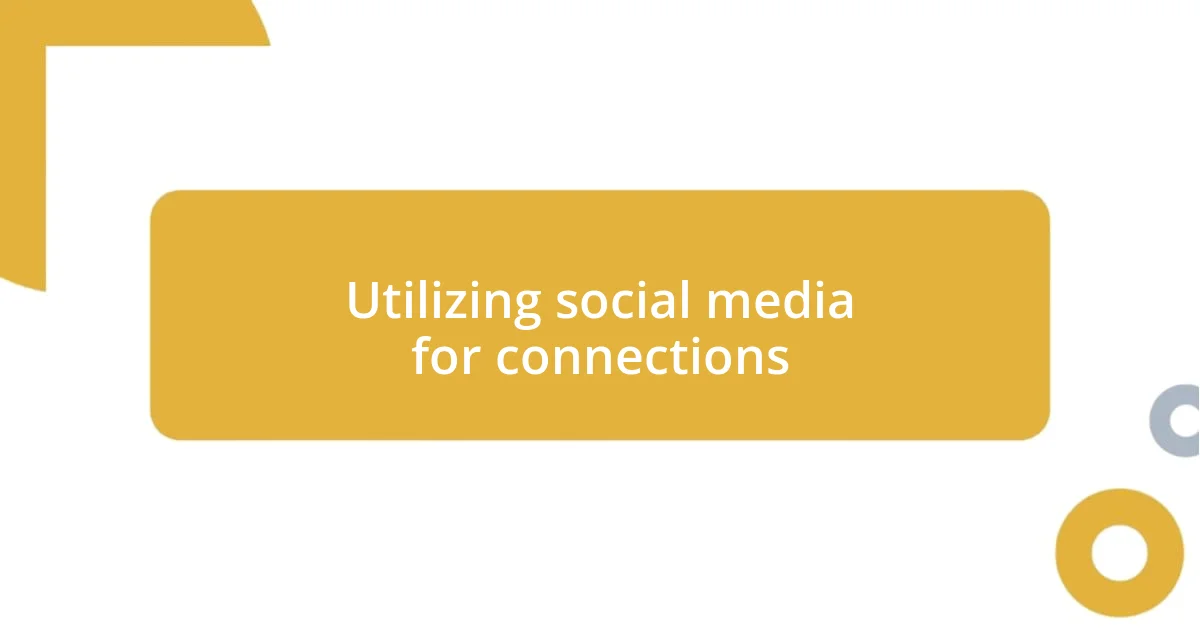
Utilizing social media for connections
Engaging with chefs and innkeepers on social media has been a game-changer for me. I can recall a time when I stumbled upon a chef’s Instagram feed filled with mesmerizing photos of his signature dishes. I took the plunge and dropped a comment expressing my admiration. To my surprise, he responded enthusiastically and even suggested a dish I should try during my next visit! Isn’t it amazing how a few words can bridge the gap between mere admiration and real connection?
Using social media not only allows for exchanging compliments but also offers a space to learn. I often see chefs sharing behind-the-scenes glimpses of their meals, from ingredient sourcing to plating techniques. Once, while scrolling through Twitter, I learned about a chef’s secret ingredient that transformed a simple recipe into something extraordinary. I reached out, and he graciously shared tips on how to utilize that ingredient myself. It’s like having a personal connection to the culinary world right at my fingertips!
Additionally, I find myself inspired by the stories chefs share about their backgrounds or culinary philosophy. Just the other day, I watched a chef’s live stream discussing the importance of seasonal ingredients. It struck a chord with my beliefs on sustainability. I couldn’t help but comment on how much I appreciated his commitment to local producers, and he replied with a heartfelt thank you, sparking a meaningful dialogue. Social media turns these connections into a collaborative journey of exploration, don’t you think?
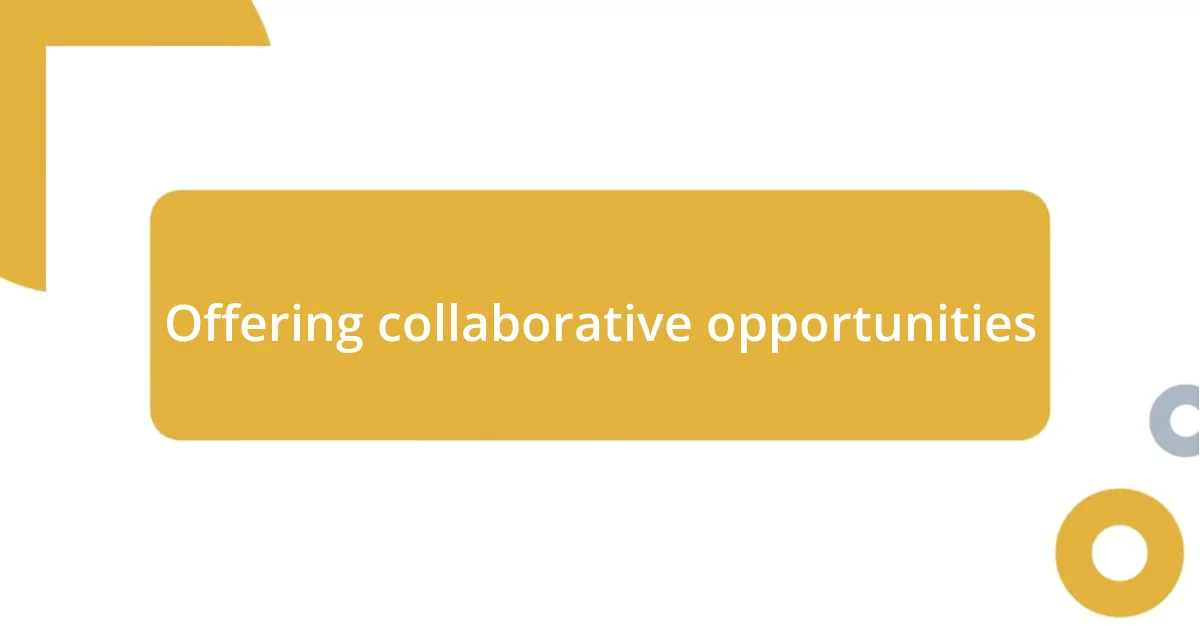
Offering collaborative opportunities
Collaborating with chefs at inns can take many forms, and I’ve found that offering to host a special dinner or cooking event is one of the best ways to create that synergy. A few months ago, I organized a themed dinner featuring dishes inspired by heirloom ingredients. Not only did this idea excite the chef, but it also brought the entire team together in a whirlwind of creativity, as they shared their insights on flavors and presentations. Have you ever noticed how a shared goal can spark genuine enthusiasm among chefs?
Another approach I’ve discovered is proposing joint projects that elevate both the chef’s and my own culinary aspirations. During one of my regular visits to a charming inn, I suggested creating a seasonal menu that highlighted the local farms. The chef embraced the idea wholeheartedly, and we spent hours brainstorming and tasting. The thrill of brainstorming in the kitchen—experiencing that blend of laughter and focus—is something I treasure. It reminds me of how collaboration not only enhances the menu but also deepens my connection with the chef.
Moreover, I often think about how collaborative opportunities can lead to innovative culinary experiences. I participated in a cook-off with a talented chef, and it turned into a delightful exchange of techniques and flavors. The excitement of healthy competition brought out the best in both of us. Sometimes I wonder: how many hidden talents lie within these creative exchanges? They can transform a simple night into an unforgettable culinary adventure that reverberates beyond the plates served.
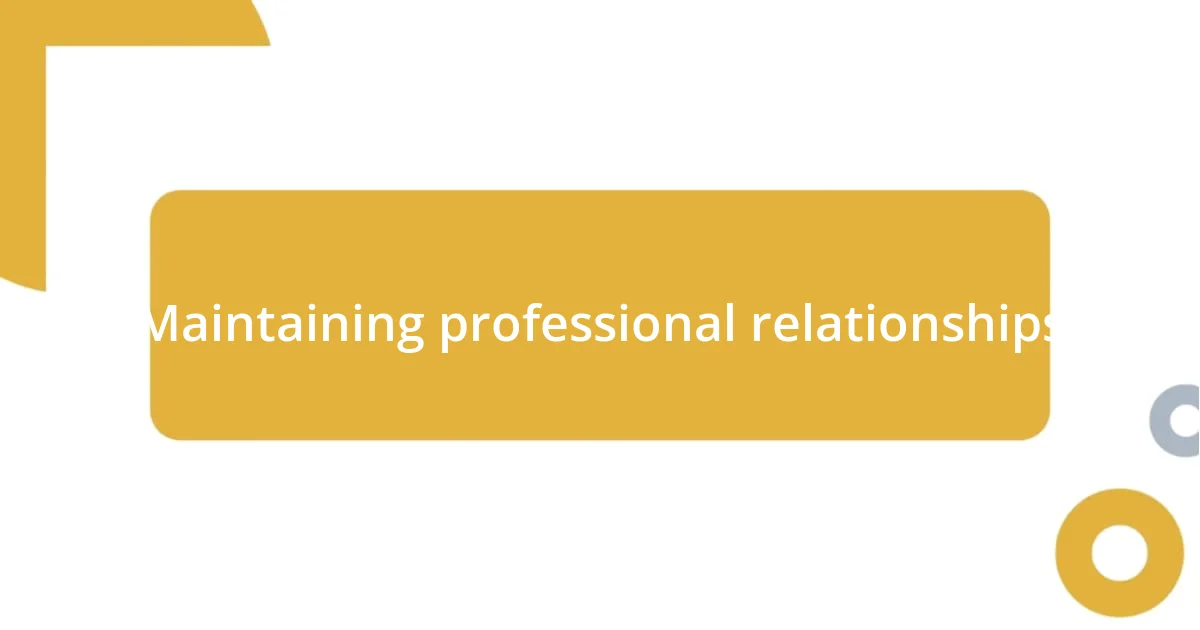
Maintaining professional relationships
Maintaining professional relationships with chefs requires genuine effort and respect. I’ve found that simply checking in after a visit can make a world of difference. The last time I did this, I sent a brief message to a chef I had worked with regularly, asking how his new menu items were faring. His appreciation for my interest reminded me that these connections thrive on personalized attention and mutual support.
I also believe that attending special events, like restaurant anniversaries or food festivals, is essential to nurturing these relationships. I vividly remember attending a chef’s pop-up dinner where not only did I enjoy incredible food, but I also had the chance to share my thoughts with him about his dishes. Connecting in such relaxed settings can foster camaraderie and opens up doors for further collaboration. Have you ever noticed how being in a more casual environment can ease conversations?
Lastly, expressing gratitude can go a long way in maintaining ties with chefs. When I received a complimentary dish after praising a chef’s unique take on a classic recipe, I made it a point to follow up with a handwritten note. It’s those little gestures that showcase appreciation and foster loyalty. I often think about how often we take kindness for granted; a simple “thank you” can reinforce a professional bond that enriches both parties profoundly.














